

MedIT. Clone ethics: What shouldn't you do with your clone? — Hopes&Fears — flow "Science" H&F: Why do you think people have a knee-jerk reaction to the phrase "playing God?
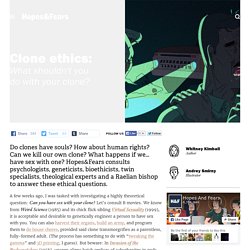
" Do you think that's more of a common worry in monotheistic religions? Do you think it interferes with people's idea of a soul? The soul is a hugely complicated question because of confusion by what we mean by "soul. " For a lot of people, a soul is a separate substance, a thing that's added to a body. At its core, Christianity kind of pulls back from ideas like that. Apply that to cloning; suppose a cell is taken from your body and is used to generate a new life. H&F: So you can't really replicate a person? No, you can't. H&F: So would an identical twin be closer than a clone?
Significantly closer. You mentioned the "playing God" thing. How do you play God? Nursing Standard - 14(16):39 - Abstract (RCNi) Tardive Dyskinesia Diagnosis. The movement disorder known as tardive dyskinesia is actually a collection of symptoms that can mimic other types of disorders such as conditions related to the side effects of antipsychotic (neuroleptic) medications and congenital disorders.

Accurate diagnosis can be challenging as there is no single test for tardive dyskinesia. The diagnostic process may involve more than one physician and requires the review of a thorough medical history, a physical examination and a neuro-psychological evaluation in order to determine whether one is indeed suffering from tardive dyskinesia or a different neurological disorder. The diagnostic process is complicated further by the fact that tardive dyskinesia symptoms can come and go, or may be more apparent at some times than at others.
An accurate diagnosis may require several office visits. Tardive Dyskinesia Symptoms. S.A.V.E. - STOP ANTIDEPRESSANT VIOLENCE from ESCALATING. Antidepressant Intoxication Legal Defenses. We have written about the dangers of S.S.R.I. antidepressants before.

Such drugs may cause psychotic, suicidal, and even homicidal tendencies without warning signs. Sex work and the London 2012 Olympics – How was it for you? We are excited to have the following guest post from Georgina Perry.
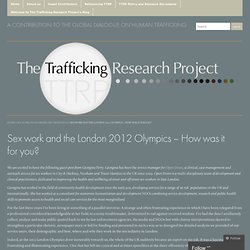
Georgina has been the service manager for Open Doors, a clinical, case management and outreach service for sex workers in City & Hackney, Newham and Tower Hamlets in the UK since 2003. Open Doors is a multi-disciplinary team of development and clinical practitioners, dedicated to improving the health and wellbeing of street and off street sex workers in East London. Georgina has worked in the field of community health development since the early 90s, developing services for a range of ‘at risk’ populations in the UK and internationally. She has worked as a consultant for numerous humanitarian and development NGOs combining service development, research and public health skills to promote access to health and social care services for the most marginalised.
New Ethics. News, updates and insights from the Centre for Medical Humanities, Durham University. CGS : Bioethics. Bioethics established itself in the late 1960s as a field concerned with the ethical and philosophical implications of certain biological and medical procedures, technologies, and treatments.
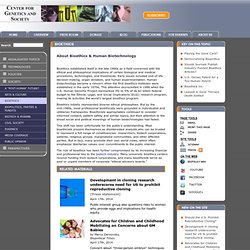
Early issues included end-of-life decision-making, organ donation, and human experimentation. Human biotechnology became a concern when the first bioethics institutes were established in the early 1970s. This attention skyrocketed in 1990 when the U.S. Human Genome Project earmarked 3% to 5% of its $3 billion federal budget to the Ethical, Legal, and Social Implications (ELSI) research program, making its activities the world's largest bioethics program. Bioethics initially represented diverse ethical philosophies. This shift has been unfortunate for the public's understanding.
The role of bioethics has been further compromised by its increasing financial and professional ties to the biotech industry. Degrees of Clarity - Utilitarianism and the Transplant Surgeon Objection. » Downloadable RTF of this piece One of the most commonly-posed objections to the moral doctrine of hedonistic utilitarianism (read: principle of greatest utility, principle of greatest happiness, or whatever label pleases), the consequentialist prescription that advocates actions only which increase pleasure and decrease pain for all affected, is a thought experiment sometimes referred to as the “transplant surgeon.”
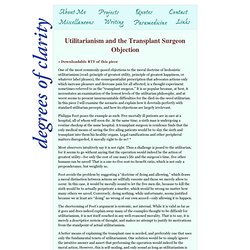
Neo Techno Ethica. Neo Eco Ethica. Who Killed the Hippocratic Oath? Thieves of Virtue: When Bioethics Stole Medecin, Tom Koch, The MIT Press, £20.95.
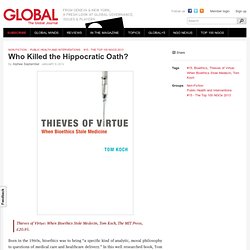
Born in the 1960s, bioethics was to bring “a specific kind of analytic, moral philosophy to questions of medical care and healthcare delivery.” In this well researched book, Tom Koch explains why contemporary bioethics fails to fulfill its role – to the detriment of patients, research subjects and citizens. Under the old Hippocratic Code, medical practitioners were care givers of the individual as well as society at large.
The code was idealistic and simplistic: some acts were encouraged and others – such as abortion or euthanasia – prohibited. But the clinical, environmental and social elements of the Hippocratic vision also provided a guide as to how health could be promoted. In the late 19th century, however, the focus shifted from patient care and communal responsibility to individual autonomy and economic efficiency. As political actors and social participants, bioethicists shape health policy. Genomics.